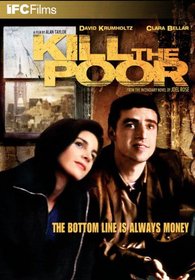| Actors: Clara Bellar, Jon Budinoff, Heather Burns, Paul Calderon, Maryfrances Careccia Director: Alan Taylor Creators: Alexis Alexanian, Gary Winick, John Malkovich, Jonathan Shoemaker, Lianne Halfon, Daniel Handler, Joel Rose Genres: Comedy, Drama Sub-Genres: Comedy, Drama Studio: Ifc Format: DVD - Color,Widescreen - Closed-captioned DVD Release Date: 09/12/2006 Original Release Date: 01/01/2002 Theatrical Release Date: 01/01/2002 Release Year: 2006 Run Time: 1hr 25min Screens: Color,Widescreen Number of Discs: 1 SwapaDVD Credits: 1 Total Copies: 0 Members Wishing: 1 MPAA Rating: Unrated Languages: English Subtitles: English, Spanish |
Search - Kill the Poor on DVD
  | Kill the Poor Actors: Clara Bellar, Jon Budinoff, Heather Burns, Paul Calderon, Maryfrances Careccia Director: Alan Taylor Genres: Comedy, Drama UR 2006 1hr 25min When a marriage of convenience becomes the real thing, Joe moves his pregnant French wife to a tenement building on New York's Lower East Side. The street is like a war zone with none of the nostalgic appeal that Joe remem... more » |
Larger Image |
Movie DetailsSimilar Movies
Similarly Requested DVDs
|
Member Movie ReviewsReviewed on 1/12/2025... Strong start about American and Immigrant struggles but then it start to fizzle. Hit the 120X FF as needed. The ending was dramatic though.
Movie ReviewsOff beat and disconnected Luca Graziuso | NYC | 08/09/2008 (1 out of 5 stars) "New Yorkers might find much to dislike about this movie, which hails as its moment of truth the starta through which gentrification is rooted in the Lower East Side of New York City. Non-New Yorkers will not be compelled to see much of anything in the movie as well, where Joel Rose's novel is translated into a script just as off beat and loud, rather excessively so, dismissing any "politics" (in the more humble sense of the term), any ethnic falvor, any whimsical characters or traditional ties that keep New York's tension well-taut. Problem is the movie attempts to build its narrative so as to evolve unto such themes and it fails miserably, in a stilted, uncompromisingly cartoonish portrait that has hardly any laughter to incite while it does all it can to tickle the psychosis of a city in flux. The young married couple (David Krumholts and Clara Bellar) represent a third generation Jewish New Yorker and a new Easter European illegal immigrant who seeks marriage for papers. The proposition becomes unexplicably a romance that crawls through the scene of a lower East Side tenement. The husband contends with an array of characters that over-engage the neurotic tendencies of ethnic groups, phobias thereby elicited, and consummate ethical equivocations. Nothing in this movie has redemptive properties and its aweful mess only clears up at the end when you feel like asking for your tme back. Independent films on this scene have been very effective as of late, "Raising Victor Vargas", "Real Women Have Curves", "Washington Heights", "Kids", "Manito", "All Night Bodega" and "Bella" confront similar issues without claiming to trace the historical steps that expose stunted growth within a narrative premise, with abundantly more success. Not to mention the fact that the here reviewed movie fails in the while. Not a fun watch, not an instructive one, acted by mediocre talents (with the exception of Jon Budinoff as Carlos' son and Paul Calderon as Carlos) and an abnoxious survey into the "soul of New York", the characters that color the city and the New York personality that surfaces as they struggle to stay afloat. The representation of Jews all the more is very didactic and listless, vapid and tame, whereas the poverty of the protagonists is unfortunately comparable to that of the movie itself which Indigent put out in good faith. This turns out to be one of their least successful projects amidts a slew of exceptional ones. The topic of gentrification deserves a better voice than either the movie or the novel have been able to echo in such a hollow application."
|















